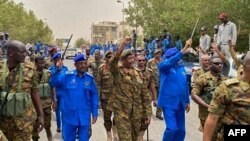In a speech addressed to the country's police force in the Red Sea city of Port Sudan on Thursday, Gen. Abdel Fattah Burhan said, “We are facing a war, and if it is not resolved quickly Sudan will be fragmented.”
Burhan’s remarks echo those he made in Egypt on Tuesday, the general's first trip abroad since the conflict broke out. During the visit, Burhan met with Egyptian President Abdel Fattah el-Sissi and discussed ways to end the fighting. But neither gave any details about any potential initiatives or terms.
However, during a separate speech on Monday, Burhan ruled out any reconciliation with the Rapid Support Forces, vowing that his forces will defeat the paramilitary, commanded by Mohamed Hamdan Dagalo.
Kholood Khair, the founder and director of Confluence Advisory, a think tank specializing in Sudanese affairs and politics, says the general is trying to pander to different camps.
There is “the domestic audience plus Egypt who want to hear that he and SAF (Sudanese Armed Forces) are equal to the task of beating the RSF, and the western international community plus Saudi Arabia who want to hear that a ceasefire might be imminent,” Khair said.
The nearly five-month conflict has reduced the capital, Khartoum, to an urban battlefield, with neither side managing to gain control of the city. In the western Darfur region — the scene of a genocidal campaign in the early 2000s — the conflict has morphed into ethnic violence, with the RSF and allied Arab militias attacking ethnic African groups, according to rights groups and the United Nations.
Egypt has longstanding ties with the Sudanese army and its top generals. Last month, el-Sissi hosted a meeting of Sudan’s neighbors and announced a broad plan for a cease-fire. All previous cease-fires brokered by the United States and Saudi Arabia foundered.
Last week Burhan managed to leave Sudan’s besieged military headquarters in Khartoum, where he has purportedly been stationed since April. He later traveled to Port Sudan, which is controlled by the army.
The fighting is estimated to have killed at least 4,000 people, according to the U.N. human rights office, though activists and doctors on the ground say the toll is likely far higher.
More than 4.6 million people have been displaced, according to the U.N. migration agency. Those include over 3.6 million who fled to safer areas inside Sudan and more than 1 million others who crossed into neighboring countries.





![Sudan Healthcare Collapsing Amid Conflict [4:21]](https://gdb.voanews.com/974d4ced-b832-4f9a-a836-4eccbd6ff5cf_w33_r1.jpg)
![Sudan Paramilitary Unveils Political Vision [4:42]](https://gdb.voanews.com/dd496ec8-39ec-4c70-82d6-5e4f8ff9cab4_w33_r1.jpg)


Forum